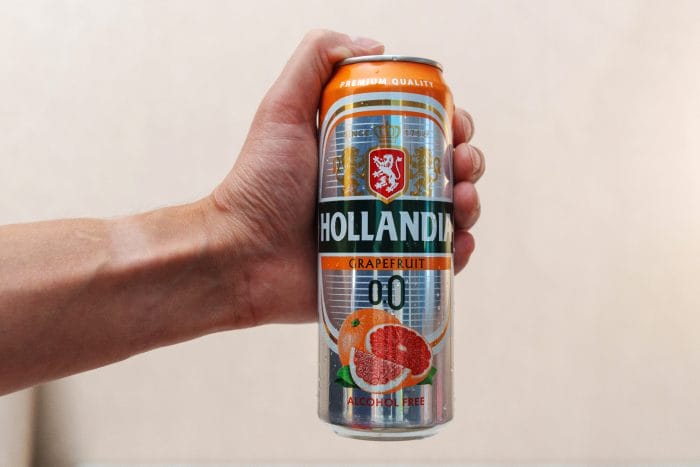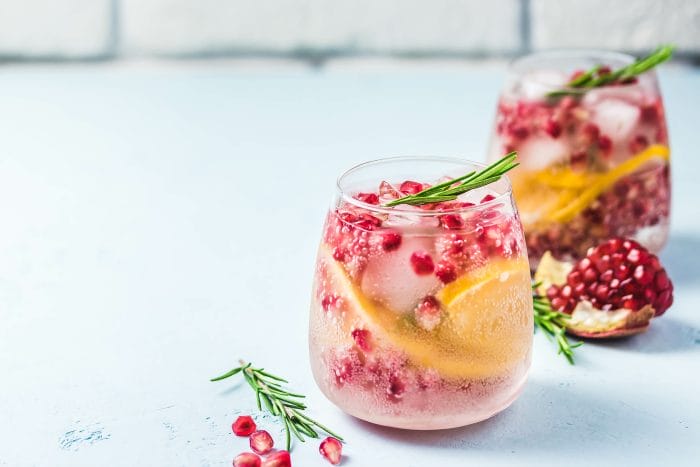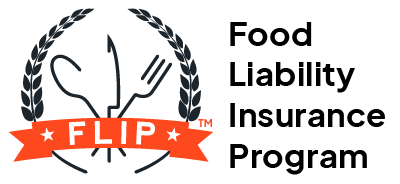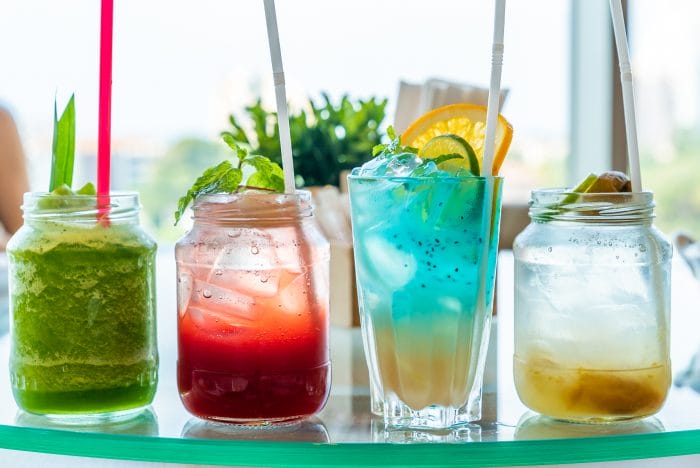Now more than ever it’s cool not to drink, thanks to the rapidly rising popularity of craft mocktails. Non alcoholic bars are reinvigorating the scene, drawing everyone from teetotallers to folks with adventurous palates with fresh takes on classic cocktails.
What Is a Sober Bar?
Sober bars (aka dry bars or temperance bars) allow patrons to enjoy the experience of going out, socializing, and enjoying unique drinks while skipping the spirits. Non alcoholic bar menus feature a wide range of mocktails, teas, and non alcoholic beers.
Dry bars aren’t just taking classic cocktails and cutting out the alcohol — they create complex concoctions that aim to titillate the taste buds. Mixologists experiment with fermentation, health-conscious ingredients, and zero-proof liquors to develop new and exciting creations.
Sober bars can technically serve people of all ages. But, many establishments opt to keep the 21-years-or-older rule to maintain the sophisticated nightlife vibes of alcohol-serving establishments.
What You Need to Know About Non Alcoholic Bars
More people choose to reduce or eliminate their alcohol consumption. In fact, in a 2024 Gallup poll on attitudes toward alcohol, 65% of people aged 18 to 35 said that (even) moderate drinking can be harmful.
That doesn’t mean they don’t want to go out and have a good time, though! Sober bars and establishments that offer both options appeal to an underserved audience. Before you start mixing mocktails and pouring non-alcoholic IPAs, let’s take a quick look at the biggest pros and cons of opening a sober bar.
Pros of Starting a Mocktail Business
- Lower business costs: Forgoing the booze saves you on big expenses, like liquor liability insurance, alcohol, and taxes.
- No liquor license required: If you choose to run a totally dry bar, you don’t need to apply or pay for a liquor license.
- Less risk of liability: Without the risk of intoxicated customers, the chance of accidents drops significantly.
- Expanded market: Offering an alcohol-free space for people to enjoy a night out can attract a whole new crowd. People who might avoid a traditional bar may feel more comfortable in a sober establishment.
- Fewer laws and restrictions: Many areas have strict rules for bars, but those don’t apply to non alcoholic businesses. You can stay open later and up to seven days a week when you don’t sell alcohol.
Cons of Starting a Mocktail Business
- Higher cost of ingredients: Alcohol-free alternatives can be expensive to stock, plus fresh and premium items are often pricey and have a shorter shelf life.
- Loss of alcohol sales: While the sober movement is growing, most of the population still likes to have an alcoholic beverage from time to time. You risk losing these customers without serving classic cocktails.
- Difficulty maintaining clientele: Some customers may view a sober bar as a novelty, visiting once or twice, but not including it in their rotation of hang-out spots.
- Differing local laws: Depending on where and how you operate, you may need to follow zoning laws, food safety regulations, capacity restrictions, and curfews.
- Customer alcohol restrictions: Non alcoholic drinks can technically contain up to 0.5% alcohol by volume. Some patrons may prefer or require zero alcohol content, which limits your ingredient options.

How to Start a Sober Bar in 6 Steps
Ready to start planning for the mocktail bar of your dreams? Pull up a stool and sip your faux-jito while we break down your steps to success.
1. Evaluate the Local Market
You may have an amazing idea, but a strong customer base is also key. Before you go all in, take the time to develop a solid mocktail business plan, which includes in-depth research on your area and potential clientele.
To start, check out trends in your region. Tools like Google Trends allow you to see if people in your area are searching for “temperance bars,” “sober bars,” “mocktails,” or other related terms. You can also set up informal polls on social media and community apps like Nextdoor to gauge interest.
In addition to looking for sober bars in your area, check out local businesses that share a customer base, such as:
- Health food stores
- Cafes and coffee shops
- Wellness centers
- Gyms
- Yoga studios
- Holistic shops
You should also research local statistics for sober and sober-curious residents. Depending on where you live, this information may be limited, but it can be highly informative if it is available.
All of this info will give you a better sense of the demand for a non alcoholic bar in your area.
If related businesses are thriving, your sober bar has a good chance of succeeding. On the flip side, if the sober movement hasn’t taken root in your town or health-conscious shops are struggling, it just might not be the right time. Instead, test the waters with a smaller commitment like a beverage cart or pop-up shop.
2. Figure Out Your Business Model
Most food and beverage businesses are either brick-and-mortar locations or mobile mocktail bars that operate from food trucks, carts, or portable setups. Here are the pros and cons of each:
Brick-and-Mortar
Pros
- Build relationships: A physical location gives customers a place to return to, which encourages repeat business and familiarity.
- Product control and presentation: Running a stationary bar means you can provide a consistent product, plus you can design and decorate the space to create the aesthetic you want.
- Enhanced credibility: Many consumers feel that brick-and-mortar locations are more reputable than their mobile counterparts.
- Opportunity to host events: When you own a physical venue, you can host entertainment and events like open mic nights, which can draw bigger crowds.
Cons
- High operational costs: You’ll have lots of additional expenses, including rent, utilities, insurance, inventory, and staffing.
- Limited reach: Opening a physical location means you will only draw clientele from a local area (minus being featured in a “best of” Food Channel show or other media attention!).
- Inflexibility: You’ll need to maintain regular hours and be prepared to work or pay staff to cover all shifts.
- Unreliable sales: Your business income depends entirely on customers coming to you. A slow week can have a big impact on a small business.
Mobile
Pros
- Flexibility: You choose where and when to open your sober mobile bar since you’re not tied to one location.
- Lower overhead costs: Without a fixed location, you’ll avoid many operating costs, and purchase only the supplies you need.
- Event opportunities: When you can take your business wherever you want, you have the chance to sign up for events all over the state or even the country.
- Reach a wider audience: Operating a mobile business means you can go where the people are. If there is a market for mocktails two towns over, you can take your product to the people who want it most.
Cons
- Irregular sales opportunities: While you can choose which events to participate in, you cannot choose how often they’re available, especially if your travel radius is limited.
- Expenses: While you don’t have to pay rent, you do need to maintain your equipment and pay for gas, vehicle upkeep, insurance, and permit fees.
- Limited space: A food truck or cart offers minimal space to store ingredients and mix drinks, which impacts the number of menu items you can offer.
- Seasonal dependence: Depending on where you operate, you may only be able to open for business during warmer months and event seasons (such as weddings and holidays).
The Best of Both Worlds: A Hybrid Approach
Starting a sober bar is a major endeavor. A creative approach that can ease the process is to partner with another business.
For example, you could pair up with someone looking to open a related business — like a health food store or a cafe — who sees how partnering with you can attract more customers to the new venture out of the gate. It helps both you and your partner with expenses and workload and creates a unique model that could appeal to a much wider audience.
Another option is to join an existing business rather than building from the ground up. For instance, if a local nightclub owner wants to offer alcohol-free events, you could take over the bar and sell mocktails on those nights. This is an effective way to get established and gauge local interest in your products.

3. Establish Your Mocktail Business
Before you start mixing and shaking, you need to complete the essential steps to establish your business.
Choose a Name and Business Structure
First the fun part: pick a name! Mocktail business names have plenty of potential for clever and catchy monikers that communicate what you do. Take some inspiration from some of the successful sober bars operating today:
- Sans Bar in Austin, Texas
- Verbena Free Spirited Shoppe in Cleveland, Ohio
- The Sober Social in Atlanta, Georgia
- Hekate Cafe & Elixir Lounge in New York, New York
Next, choose your business structure. Depending on the model you choose, a partnership or limited liability company (LLC) is likely your best option. Each of these offers legal protections that keep your business separate from your personal finances (vs. operating as a sole proprietor).
Register Your Business
Register your new business with your state to ensure you’re compliant with local laws and regulations. Every area is different, so it’s important to research local requirements. You may need to pay fees or apply for permits before the state will give you the go-ahead.
Don’t forget to check local licensing requirements as well. Your city or county may have additional requirements for starting a business.
Fulfill Federal Business Registration Requirements
Established businesses need an employer identification number (EIN) for banking and tax purposes. This functions like a social security number for your business. It’s free, and you can apply online with your essential information.
Unless you are operating as a sole proprietorship, you’ll also need to comply with the recently enacted Corporate Transparency Act. This law requires all US-based businesses with fewer than 20 employees to file a Beneficial Ownership Information (BOI) within 30 days of starting the business.
Apply for Permits
Depending on where and the nature of your business, you will likely need at least one or more permits to operate in your state. If you also sell alcoholic beverages, you’ll need to apply for a liquor license through your state’s alcohol control agency. However, if you’re running a strictly sober bar, you can skip that step.
Mobile businesses, like food trucks and carts, may have a few unique license requirements. Always check your state’s laws before you open.
Get Insured
Every responsible business owner needs to carry insurance, and this is especially true in the food and drink industry. Beverage vendor insurance can protect you from common claims associated with your business and products. If a customer slips on a spilled drink or gets food poisoning from your boba tea mocktail, insurance helps cover the cost.
Alcohol-serving businesses can be held responsible for claims caused by intoxicated customers (which isn’t covered by a standard liability policy). So in addition to general liability insurance, you need additional coverage if you serve both alcoholic and non alcoholic drinks. Bartender insurance protects you from these types of claims.
Open a Business Bank Account
To ensure that your personal finances remain separate from your business, you need to open a bank account using your company’s name and EIN. Use this account to deposit business-related funds, process credit card payments, and pay for supplies and equipment.

4. Develop Delicious Mocktail Recipes
Part of the beauty of opening a sober bar is the opportunity to get creative and explore unique combinations and flavor profiles. When the alcohol isn’t the star, you have more freedom to play around with fun new ingredients and updated versions of classic drinks.
Trending superfoods and ingredients also provide an excellent foundation for your drink recipes. Many of your patrons will look for options that include:
- Fermentation (e.g., yogurt, kombucha, kefir)
- Reduced sugar and natural sweeteners
- Berries (e.g., acai and goji berries)
- Vegan and vegetarian options
- Matcha
- Boba
- Pomegranate
- Cucumber
- Liquid smoke
Many mixologists are also playing with unexpected flavor combos, adding savory and salty options to their repertoire.
Your unique recipes are what will make your alcohol-free bar shine, so don’t be afraid to be adventurous and take risks. Just do some quality assessment by testing your recipes on friends and loved ones before you add them to your menu.
5. Market Your Sober Bar
It’s time to spread the word that there’s a new place for sober and sober-curious people to hang out and have a non alcoholic drink. Here are some quick tips for how to effectively market your mocktail business:
- Create a website: 80% of consumers search for businesses online before visiting in person. A strong website allows potential customers to find you, learn more, and hopefully give your non alcoholic bar a try.
- Print business cards: Sites like Vistaprint offer free templates to customize your cards, plus several affordable printing options. Hand them out to other businesses, colleagues, customers, and anybody else who can spread the word.
- Network and collaborate: Attend networking events to meet fellow business owners. These connections can help spread the word about your sober bar and may even create opportunities to form mutually beneficial arrangements with like-minded businesses.
- Build a social media presence: Create accounts on Facebook, Instagram, and TikTok to reach a broader audience and show off what you can do. Make sure to use your business name as your handle across all channels.
- Encourage customer feedback: Word of mouth is a powerful marketing tool. Ask your customers to write reviews, post about your business on social media, and tell their friends.
Mocktail bars have an edge based purely on their uniqueness. Going out without getting drunk is trendy, so take full advantage of the sober curious movement and highlight the benefits of your bar.
Pro Tip: Looking for more ways to boost your social media presence? Learn how to market your business on Instagram.
The Recipe for a Winning Mocktail Business
1 part business know-how
2 parts creativity
Dash of innovation
Blend and serve.
With a customer base that’s ready and waiting, now is the time to start a non alcoholic bar. You can get in on this growing industry from the ground up and innovate a whole new kind of nightlife in your town.
FAQs About Sober Bars
What Are the Startup Costs Involved in Opening a Sober Bar?
The cost of opening a sober bar ranges from $50,000 to $150,000. Necessary expenses include:
- Mortgage, rent, or lease
- Equipment (e.g., mixer, refrigerator, freezer, commercial sink, etc.)
- Furniture and decor
- Signage
- Advertising
- Inventory and ingredients
- Staffing
- Marketing
- Licenses and permits
- Insurance
- Technology
Pricing will vary based on where you operate. Depending on your business model, your overhead may be lower.
What Are Some Creative Revenue Streams for a Sober Bar Beyond Drink Sales?
- Live entertainment
- Trivia nights
- Private parties
- Food sales
- Board game nights
- Non alcoholic mixology classes
- Wellness workshops
- Membership program
- Merch sales

By Lindsey Fliger
Ohio-based copywriter Lindsey Fliger leverages her experience as a lifelong foodie, dedicated home chef, and very decent baker. She holds a bachelor’s in English from Kent State University and a master’s in English Literature from The University of Akron. Before Veracity, she wrote about everything from kitchen tools to decadent wines at Zulily.

